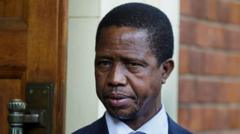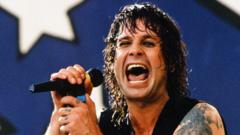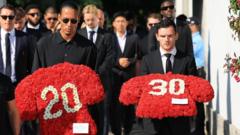Gathered at St. Peter’s Square, thousands of mourners, including heads of state and the disadvantaged, paid tribute to Pope Francis at his funeral, reflecting on a papacy characterized by compassion for marginalized communities and a commitment to inclusivity.
Final Farewell: The World Bids Adieu to Pope Francis at His Funeral

Final Farewell: The World Bids Adieu to Pope Francis at His Funeral
Pope Francis' funeral draws a global audience of mourners, leaders, and advocates, spotlighting his legacy of humility and inclusion within the Catholic Church.
Pope Francis’ funeral took place Saturday in St. Peter’s Square as thousands of mourners gathered to pay their final respects to the beloved pontiff, known for his inclusive approach to the Roman Catholic Church. Expected to attract up to 100,000 attendees, the service drew a diverse crowd ranging from royalty and world leaders to everyday Catholics, illustrating the deep admiration many held for his leadership.
Having passed away at the age of 88 on Monday, the late pope was the first Jesuit and the first from Latin America to lead the Catholic Church. In a departure from traditional ceremonies, Pope Francis had previously sought to simplify his funeral. The Mass was framed to honor his emphasis on humility, while still promising the grandeur typical of papal farewells—the presence of numerous cardinals, world leaders, and countless followers embodying the essence of Catholic pageantry.
International dignitaries from across the globe were expected to attend, including personalities like former President Trump, current President Biden, and Argentina’s President Javier Milei, who has previously made contentious remarks about the pope. This juxtaposition of attendees highlighted the complexities of international relationships and the polarized perceptions of Francis throughout his papacy.
Following the Mass, which began at 10 a.m. local time, Pope Francis’ modest wooden coffin would be transported to the Papal Basilica of Santa Maria Maggiore, where he will be laid to rest amid a private burial ceremony attended by those he most championed—poor and marginalized individuals, reflecting his lifelong advocacy for the vulnerable.
Security measures were robust, with approximately 3,000 volunteers assisting law enforcement as stringent protocols were implemented across the bustling streets of Rome. Many streets were shut to traffic, and thousands of police officers patrolled to ensure safety amid the large crowds expected.
As mourners prepared to send their beloved pope off, they recalled the significant changes he brought to the Catholic Church—highlighting issues such as migration, poverty, and environmental concerns. Events throughout the week, including special Masses in honor of Francis at churches across Rome, were set to extend over the following days, ensuring his legacy of compassion and action remains palpable within the community.
Pope Francis' death closed a chapter in the Catholic Church marked by a shift towards greater inclusivity and outreach, as the Church faces the ongoing task of selecting his successor—a delicate process that will unfold among the College of Cardinals.





















